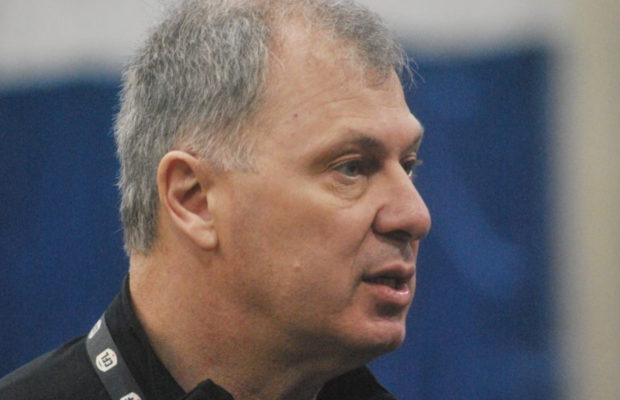Pandemic planning keeps Canadian Football League commissioner busy; league start now hot topic

It should not surprise anyone that the Canadian Football League’s movers and shakers, unable to move out of self-isolation, are beginning to shake at the prospect of turning the page on what has been the cruellest month.
Rookie training camps are scheduled to open in 50 days, main camps in 54, but both are imperilled by the COVID-19 pandemic. An on-time start, full preseason and 18-game regular season are highly unlikely. A delayed start, shortened schedule and even a Grey Cup in December are all possible.
Commissioner Randy Ambrosie said league personnel recently discussed how many games teams would have to play to maintain the integrity of the regular season.
“We started that very conversation just over the last several days and there have been some very good ideas. We know it doesn’t have to be 18. You don’t have to play a full 18 games to say that you had a regular season that justifies the playoffs and a Grey Cup game. But we haven’t landed on what the minimum number would be.”
Sources say it could be as low as eight, though 10 seems more likely. That decision can still wait, however, as the league has yet to circle the date at which they must go forward or call off training camps and, therefore, the season.
“We know how it looks, we modelled it all out, but we haven’t said we’re going to make a decision by (a certain) date,” said Ambrosie. “Those things will happen in the weeks ahead, in discussions with the presidents. The advantage of it being March is that it’s March. But boy, when you start getting into April, things start getting real.”
This season is supposed to begin June 11 and end in a successful Grey Cup on Nov. 22 in Regina. But the pandemic has forced the league to explore all sorts of contingencies, including whether the championship game could be moved indoors to B.C. Place Stadium in Vancouver in early December if need be.
“It’s not something that we’re actively planning. I would be dishonest to say that it didn’t come up in a conversation,” said Ambrosie. “But the Saskatchewan Roughriders, the City of Regina, the Province of Saskatchewan, everyone in that province has been planning to put on a party for the ages, and right now we’re not making any adjustments to that plan. Because, when this is all done, I can’t think of a better place to go to celebrate Canada’s most important national championship and a day that we all come together. I can’t imagine a better place to be than Regina on Nov. 22, so right now that is our plan.”
But the ticking of the clock has replaced the hum of excitement that would normally have been increasing in volume at nine team headquarters and the CFL office in Toronto, buildings that are now all but abandoned. Ambrosie, for instance, was seated at a card table at his family cottage in Ontario on Monday afternoon, ear glued to a cellphone. He has spoken non-stop to league governors, team presidents, general managers and coaches, CFL staff, CFL Players Association officers, TSN executives and media members.
“I’m trying to be a good listener,” he said, when asked what his primary function is these days. “I am trying to help frame some of the most important issues that we’re facing. I’m trying to be a voice of reason, I guess, as we think things through. You know, there’s lots of emotion. I also like to think I’m someone who can lend a voice to helping everyone do the right thing so we can get past this crisis.”
With the amount of crisis planning underway now, Ambrosie has had to hit the pause button on the CFL’s innovation committee, which was tasked with thinking big and outside the lines. The committee includes Edmonton president Chris Presson, TSN executive Paul Graham, CFLPA executive director Brian Ramsay, Saskatchewan head coach Craig Dickenson and six others.
“We’re on pause,” said Ambrosie. “With the sheer volume of other priorities, we just put some of those things on pause, but we have got no less enthusiasm for them.”
The league has already made massive changes to its off-season activities, cancelling free agent camps in the United States and player combines in Montreal, Edmonton, Toronto and Mexico, postponing the global player draft from April 16 to a so-far unspecified date prior to the opening of training camps and shuttering team facilities. So far, a B.C. Lions position coach is the only CFL member whose positive test for COVID-19 has been made public.
But the impact of the pandemic has been felt all across a league in limbo.
BORDER ISSUES
As vital as American players are to the Canadian Football League, their travel to training camps from Vancouver to Montreal would not be deemed essential.
That said, if Canada’s border with the United States is still closed to most traffic in May, it would throw a serious wrench into the CFL’s ability to proceed with the 2020 season. But league commissioner Randy Ambrosie knows this is not the time to plead his case with Canadian officials.
“It’s not something we have been speaking to the government about, but we certainly have been watching to see how that is unfolding,” said Ambrosie. “And, as it relates to the global situation with the virus, we’re watching all of it, like everyone else, I guess.
“It’s probably premature for us to be talking to the government about their border strategy because right now we want our government to be focused on supporting Canadians and getting us through this crisis.
“Frankly, all governments at all levels have my support because we need them now more than ever.”